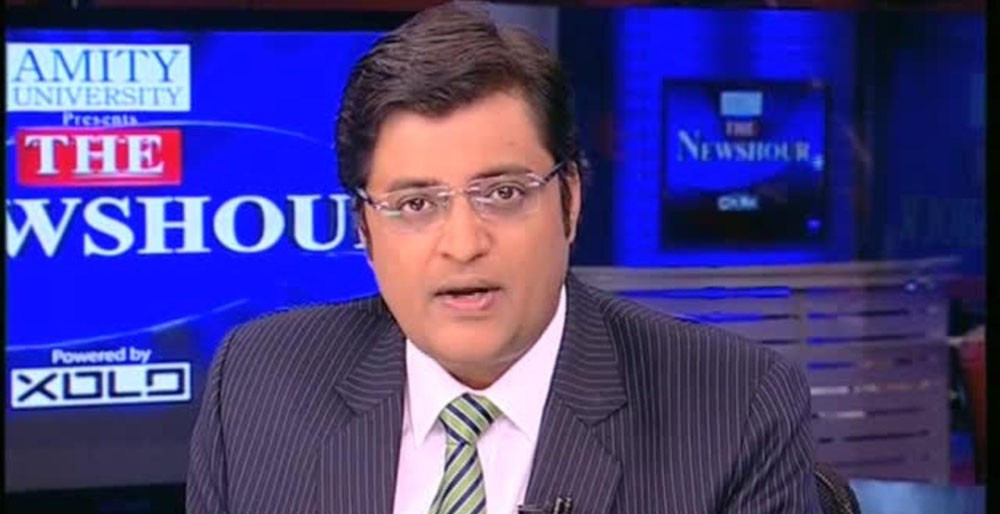
Arnab Goswami is one of those anchorpersons who widen gulfs than build bridges

"Fast and furious", as one of his many detractors has famously called him, is not an accurate description of Arnab Goswami, news anchor and the editor-in-chief of Indian news channel Times Now. He is much more than that: he is loud, irreverent and particularly scornful towards Pakistan. The reverberations of his jarring voice often reach Pakistan and he is therefore no stranger to Pakistanis.
The impression of him as loud, aggressive and prone to interrupting far too much seems a ploy to make him look different from the seasoned crop of his predecessors like Prannoy Roy and Karan Thapar. Goswami considers the former as his mentor. Those stalwarts of Indian media talked in measured tones, chose their words carefully, and stressed on content rather than theatrics.
Goswami belongs to a prominent family of Assam. He acquired his early education at the Indian army cantonment school. His father is a retired Indian army officer, who contested elections as a Bharatiya Janata Party (BJP) candidate and lost. These facts explain rather well his not so amiable views about Pakistan.
He got his master’s degree in Social Anthropology from Oxford, followed by a year-long fellowship at Sidney Sussex College, University of Cambridge.
In his talkshow, Frankly Speaking with Arnab, many prominent personalities have been rubbed the wrong way -- Rahul Gandhi being one of them. Exhibiting his usual smugness, he took great pride in exposing the 45 years "young" Gandhi’s ineptitude regarding some fundamental issues of Indian politics. The interview, according to him, cost the Congress the 2014 election and marked the rise of Narendra Modi. Perhaps, the only time Goswami has shown restraint was when he interviewed Bal Thackeray and later his nephew Raj Thackeray.
So, Goswami knows when and where to be pragmatic, particularly if he has to live and function from Mumbai.
He visited Cambridge last week to deliver a talk, titled Media and Politics: Indian perspective, at St Catharine’s College. Although he was eloquent in his presentation that underlined corruption as the fundamental social malaise and explained his insatiable desire to unearth scandals, in his disdain for politicians and hyper-nationalism he sounded hardly any different from many Pakistani anchors.
So, then, are the anchorpersons in both Pakistan and India a part of the problem than solution?
Surprisingly, during the talk, issue of communalism and the state of minorities under the current Modi government was not mentioned at all.
In his presentation, Goswami boasted that he has exposed 11 scandals in two years. A couple of Pakistanis sitting among the audience drew a vicarious comfort from the fact that the volume of corruption in India is quite excessive.
Pakistani academics usually show their annoyance over Pakistan’s India-centric approach but the same holds for the Indians. Goswami loves to talk about Pakistan as India’s binary opposite. He castigated Manmohan Singh for the ‘candy-floss’ approach of his government towards Pakistan, arguing that India should flex its muscles and put Pakistan in its place. He said that perhaps without knowing what the consequences of such a ‘show of muscularity’ might entail for the two nuclear armed states.
Edward Anderson, a doctoral scholar on India, described Goswami as someone catering to the needs of the upwardly mobile and English-speaking Indian middle-class. Now, the size of the Indian middle-class is increasing rapidly; it is almost 300 million. Thus, English is the pan-Indian language and news anchors, like Goswami, Barkha Dutt and Rajdeep Sardesai, as the central characters of the sound-bite politics of television, have a large and continually expanding constituency.
While stressing on the role of English as a lingua franca, he laid great stress on the Indian accent. "We, Indians should be proud of our accent," he said. While stating this, he was probably not aware of the intricacies that emanate from issues as accent and script. Whether any particular accent can be designated as Indian is an extremely sticky question. Not only a certain language but a particular accent, too, is an instrument of empowerment in all post-colonial countries.
Goswami sees India as a media powerhouse in the next five to seven years. Given the progress that the independent channels in India have shown in the last 10 years, it is quite possible.
I came to know about Arnab Gowasmi when he invited Pervez Musharraf to his show and tried to quiz him in his usual intimidating style, not knowing what he was up against. The video of Musharraf taking him to task was widely circulated on social media by a group of Musharraf’s admirers. That was when I too, despite being opposed to such equivocating notions as nationalism, came to admire Musharraf, even though only momentarily.
All said, Goswami is one of those anchorpersons who widen gulfs than build bridges. Listening to him, those people who don’t have a position are pushed to take one of the limited binary opposites on offer. Rather than destroying hypocrisy and corruption, what thus gets sacrificed is the will to co-exist.